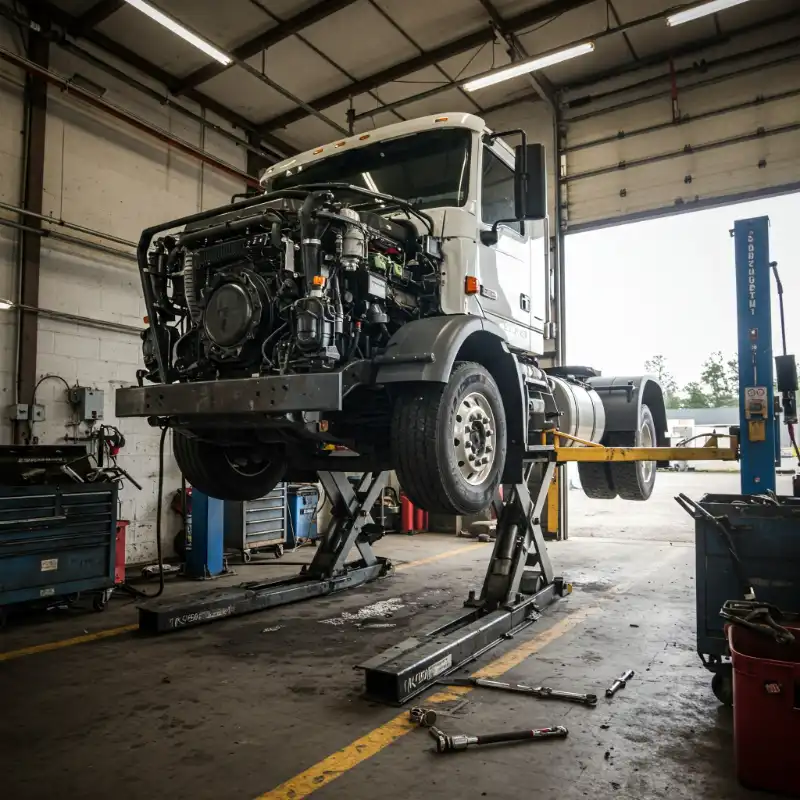Proper maintenance is the key to maximizing the performance and longevity of your engine. This guide will walk you through the most crucial aspects of diesel engine maintenance, ensuring that your fleet remains in top condition on the road.
Importance of Diesel Engine Maintenance
Diesel engines power the vast majority of semi-trucks. However, like any machine, regular maintenance is essential to ensure it continues running optimally. Neglecting maintenance can lead to reduced fuel efficiency, costly repairs, and, ultimately, unplanned downtime.
What are the essential components of a diesel engine?
Before diving into maintenance tips, it's essential to understand the key components of a diesel engine. The primary elements include:
- Cylinder: This is where combustion occurs.
- Piston: Moves within the cylinder to generate power.
- Fuel Injector: Sprays fuel into the cylinder.
- Crankshaft: Converts the motion of the pistons into rotational energy.
- Turbocharger: Increases engine efficiency by forcing more air into the combustion chamber.
These components work together to convert fuel into mechanical energy, powering your truck and keeping your business moving. Keeping them in good condition is critical for engine longevity and performance.
Diesel Engine Maintenance Best Practices
Regular Oil Changes
Oil lubricates moving parts, reduces friction, and helps manage heat. Over time, engine oil can become contaminated with debris, reducing its effectiveness. Failing to change the oil regularly can result in increased wear and tear on your engine, leading to costly repairs down the road.
At OTR Fleet Service, we recommend following the manufacturer’s guidelines for oil change intervals, which typically range from 10,000 to 25,000 miles, depending on your engine's make and model. Always use high-quality diesel engine oil and replace the oil filter with each oil change to ensure maximum protection.
Monitor and Replace Air Filters
Air filters play a crucial role in protecting your engine from harmful debris and contaminants. A clogged air filter can restrict airflow, leading to reduced engine performance and fuel efficiency. In extreme cases, it can cause engine damage. Regularly inspecting and replacing the air filter is a simple yet effective way to maintain your engine's health.
Typically, air filters should be checked every 10,000 miles and replaced as necessary. In dusty environments, more frequent checks may be required.
Fuel System Maintenance
Diesel engines rely on a clean and efficient fuel system to perform optimally. Over time, contaminants can build up in the fuel injectors, leading to poor fuel atomization and reduced engine performance. Regular fuel system maintenance is crucial to prevent these issues.
Consider using a high-quality diesel fuel additive to keep the injectors clean and improve fuel efficiency. Additionally, replacing the fuel filter at recommended intervals (typically every 15,000 to 30,000 miles) will ensure that your fuel system remains free of debris.
Cooling System Maintenance
The cooling system in your diesel engine is responsible for regulating engine temperature, preventing overheating, and protecting your engine from damage. A malfunctioning cooling system can lead to catastrophic engine failure, making it essential to stay on top of maintenance.
Inspect the coolant level regularly and top it off with the appropriate coolant mixture as needed. The coolant should be changed every two to five years, depending on the type of coolant and the manufacturer's recommendations. Additionally, inspect the radiator and hoses for leaks or damage, as these can lead to coolant loss and engine overheating.
Keep the Turbocharger in Check
Turbochargers are integral to many diesel engines, enhancing performance by increasing air intake and boosting power. However, turbochargers are susceptible to wear and tear, especially in high-mileage engines. Regularly inspect the turbocharger for signs of damage, such as oil leaks, unusual noises, or reduced boost pressure. Keep an eye on your engine's performance—any sudden drops could indicate a problem with the turbo.
Preventive Maintenance Schedules
Preventive maintenance is the backbone of engine longevity. By adhering to a strict maintenance schedule, you can catch potential issues before they become major problems. A typical preventive maintenance schedule includes regular oil and filter changes, coolant system inspections, fuel system checks, and air filter replacements.
What are the benefits of preventive maintenance?
Preventive maintenance helps avoid costly repairs, improves fuel efficiency, and extends the life of your engine. By catching issues early, you prevent them from escalating into more significant problems, saving you both time and money in the long run. Additionally, a well-maintained engine operates more efficiently, reducing fuel consumption and emissions.
Electrical System Care
The electrical system in your diesel engine is responsible for powering essential components such as the starter motor, alternator, and battery. A failing electrical system can lead to hard starts, dim lights, and even engine stalling. Check the battery terminals for corrosion, and ensure the battery is holding a charge. Inspect the alternator for signs of wear and tear, as a failing alternator can lead to a dead battery.
How often should you inspect your battery and alternator?
Regular battery inspections should be conducted at least twice a year, and alternators should be checked during routine maintenance visits. This ensures that your electrical system remains reliable, especially during harsh weather conditions.
Final Thoughts on Diesel Engine Maintenance
Diesel engine maintenance is an ongoing process that requires attention to detail and regular care. By following these best practices, you can extend the life of your engine, improve fuel efficiency, and reduce the risk of unexpected breakdowns.
At OTR Fleet Service, serving Houston, San Antonio, Austin, and Dallas, we specialize in keeping your diesel engines running at their best. Whether you need routine maintenance, repairs, or a custom preventive maintenance plan, our experienced technicians are here to help. Contact us today to schedule your next service and keep your fleet on the road where it belongs.










.webp)





























